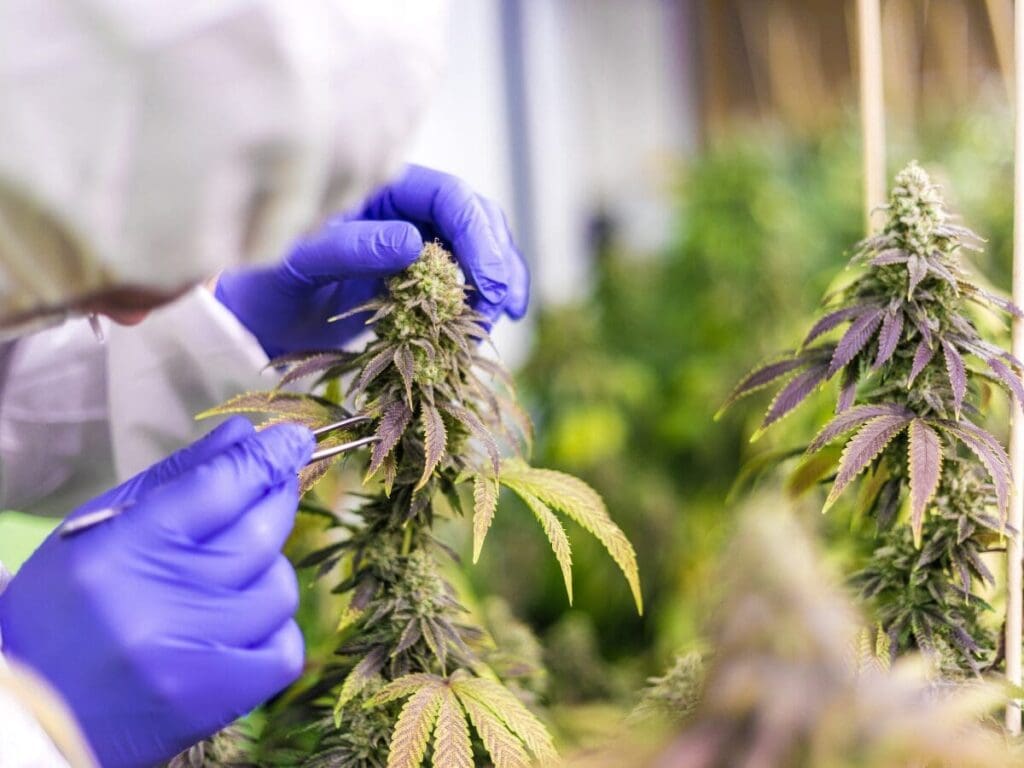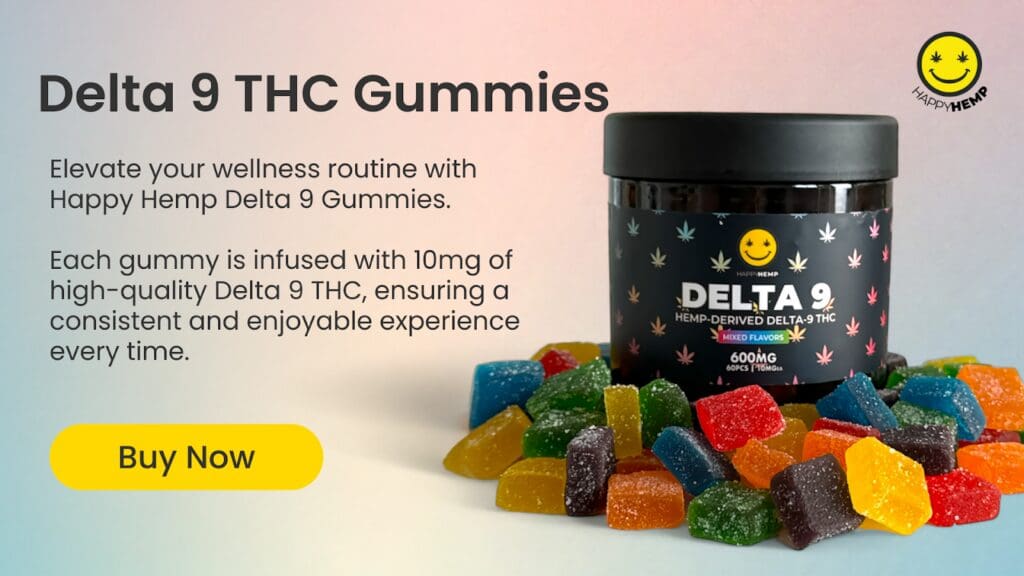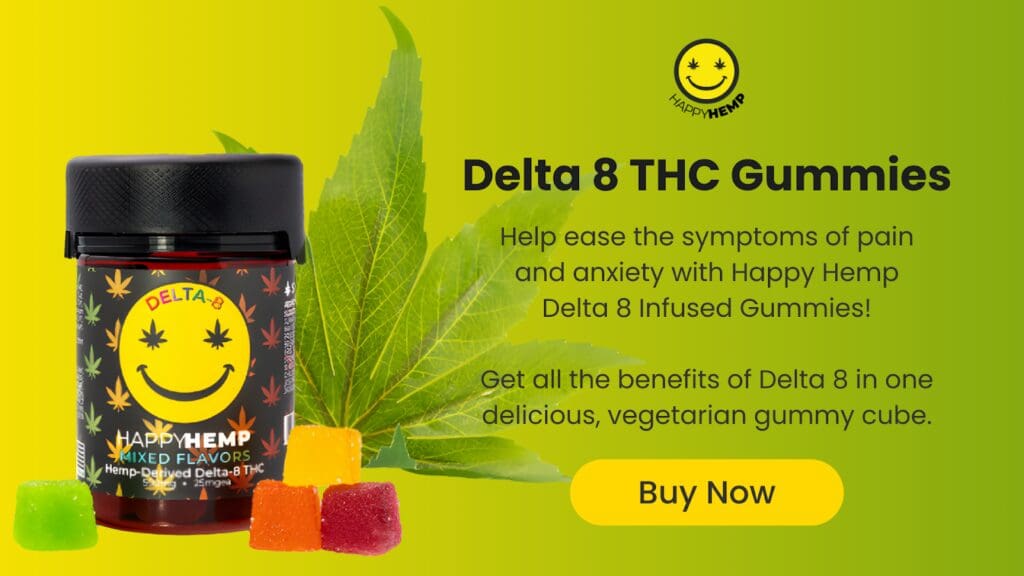Key Takeaways:
- Potency Difference: Delta 9 offers a stronger high, while Delta 8 provides a smoother, more manageable experience.
- Legal Loopholes: Delta 8 is more widely available due to hemp laws, but legality is rapidly evolving.
- User Experience: Delta 8 is favored by those who want THC’s benefits without intense side effects like anxiety or paranoia.
Understanding the differences between Delta 9 and Delta 8 THC is crucial for consumers seeking the right fit for their needs. While they may seem similar, their effects, legal status, and popularity differ significantly.
At Happy Hemp, we pride ourselves on delivering high-quality CBD and Delta products that are rigorously tested and crafted with care. With a commitment to transparency and customer satisfaction, our products are trusted by thousands to provide consistent, reliable results.
In this piece, we’ll explore the key differences between Delta 9 and Delta 8, helping you make an informed choice.
What Are Delta 9 And Delta 8?
Delta 9 and Delta 8 are both forms of THC (tetrahydrocannabinol), the primary psychoactive compound found in cannabis. However, they have some key differences. Delta 9 THC is the most commonly known and naturally occurring form, responsible for the classic “high” associated with marijuana. It binds strongly to cannabinoid receptors in the brain, which results in its potent psychoactive effects.
Delta 8 THC, by compasion, is a less prevalent form of THC. It occurs in smaller quantities in cannabis plants and is often derived from hemp through a conversion process. While Delta 8 also binds to cannabinoid receptors, it does so with slightly less affinity, making its effects milder compared to Delta 9.
Despite their differences in potency, both Delta 9 and Delta 8 interact with the endocannabinoid system, influencing mood, memory, and perception. The rising interest in Delta 8 stems from its more subtle effects, which some users prefer over the stronger impact of Delta 9.
If you’re seeking a balanced, enjoyable way to experience the benefits of cannabinoids, check out our Delta 8 and Delta 9 Gummies. Whether you’re after the milder, more subtle effects of Delta 8 or the more potent experience of Delta 9, both options offer a convenient and flavorful approach to supporting your wellness. Try our assortment of Delta 8 gummies and Delta 9 gummies now and discover the difference that best suits your needs!
The Chemical Structure: How Delta 9 And Delta 8 Differ
Delta 9 and Delta 8 THC are nearly identical in chemical structure, with just a small difference in the placement of a double bond in their carbon chain. This difference might seem minor, but it significantly impacts how each compound interacts with the body’s endocannabinoid system.
Delta 9 THC has the double bond on the ninth carbon atom of the chain, while Delta 8 THC has it on the eighth. This slight shift in molecular structure alters how they bind to the CB1 and CB2 receptors in the brain and body, which in turn influences the intensity and type of psychoactive effects experienced.
The structural difference makes Delta 8 slightly less potent and more stable than Delta 9. Delta 8’s stability means it has a longer shelf life, making it appealing for manufacturers, while the lower potency translates to a milder “high” that many users find more manageable.
Psychoactive Effects: Comparing Delta 9 And Delta 8
One of the most noticeable differences between Delta 9 and Delta 8 is the intensity of their psychoactive effects. Delta 9 THC is known for producing a strong, often euphoric high, with effects that can include altered sensory perception, increased appetite (commonly known as the “munchies”), and even anxiety or paranoia in higher doses. This is the type of high most associated with traditional marijuana use.
Delta 8 THC, in contrast, offers a much milder psychoactive experience. Many users describe the Delta 8 high as more clear-headed and relaxed, without the intensity or side effects like anxiety that can sometimes accompany Delta 9 use. Delta 8’s effects are often described as calming and soothing, making it an attractive option for those who want a gentler experience or need to maintain more focus and functionality during use.
Overall, while both compounds produce a high, Delta 9 is far more potent and intense, whereas Delta 8 provides a more moderate, controlled experience.
Legal Status: Delta 9 Vs Delta 8
The legal status of Delta 9 and Delta 8 THC varies significantly, largely due to federal and state regulations regarding cannabis and hemp-derived products.
Delta 9 THC is tightly regulated in most countries, including the United States. Under federal law, Delta 9 THC is classified as a Schedule I controlled substance, meaning it is illegal at the federal level, though many states have legalized its use for medicinal and recreational purposes. The legality of Delta 9 THC depends on where you live, with some states allowing its use, others restricting it, and some banning it altogether.
Delta 8 THC, however, exists in a bit of a legal gray area. Since Delta 8 is typically derived from hemp, it benefits from the 2018 Farm Bill, which legalized hemp and hemp-derived compounds containing less than 0.3% Delta 9 THC. This loophole has allowed Delta 8 to be sold in many states where Delta 9 is still illegal. However, some states have moved to restrict or ban Delta 8, citing concerns over its psychoactive effects and lack of regulation.
In summary, Delta 9 faces stricter legal control, while Delta 8 is more widely available, though subject to increasing scrutiny.
Availability And Popularity Of Delta 9 And Delta 8
When it comes to availability, Delta 9 THC and Delta 8 THC have different market dynamics. Delta 9, being the primary psychoactive component of cannabis, is widely available in states where marijuana is legal for recreational or medicinal use. It’s commonly sold in various forms, including flower, edibles, tinctures, and concentrates at licensed dispensaries. However, in states where marijuana remains illegal, Delta 9 is often unavailable, or its possession and use can carry legal penalties.
Delta 8 THC, on the other hand, has gained popularity in recent years, especially in states where Delta 9 is still prohibited. Delta 8 is often sourced from hemp and sold in many locations across the U.S. through online retailers, vape shops, and even convenience stores. Because it can be derived from legal hemp, Delta 8 products have been able to reach a broader market, making them easier to find in places where traditional marijuana products are restricted.
As a result, Delta 8 has become particularly popular among consumers looking for a legal alternative to Delta 9, offering a milder high without breaking state laws. This growing demand has made Delta 8 a rising star in the cannabinoid market, though its legal future remains uncertain.
Cost Comparison: Delta 9 Vs Delta 8
The cost of Delta 9 and Delta 8 products can vary depending on several factors, including availability, demand, production methods, and legal status.
Delta 9 THC products tend to be more expensive in states where cannabis is legal, due to taxes, regulations, and the higher cost of production in licensed dispensaries. These products often go through rigorous testing and quality control, which contributes to the price. In states where Delta 9 THC is illegal, prices can be even higher on the black market due to the risk involved for sellers and buyers.
Delta 8 THC, on the flip side, is generally less expensive than Delta 9 products. This is largely because Delta 8 is typically derived from hemp, which is more widely available and cheaper to cultivate. The lack of strict regulation on Delta 8 products also means that production costs are lower, and these savings are often passed on to consumers. However, as the legal status of Delta 8 becomes more scrutinized, prices may rise if regulations increase.
User Experience And Preferences: Delta 9 Vs Delta 8
User experience is a key factor in choosing between Delta 9 and Delta 8, as personal preferences often dictate which compound best suits individual needs.
Many Delta 9 users enjoy its intense psychoactive effects, particularly those seeking a strong euphoric high. For recreational users, the potency of Delta 9 is often seen as desirable, providing a full-body experience with heightened sensory perception, deep relaxation, and in some cases, bursts of creativity. However, some users report unwanted side effects like anxiety or paranoia, especially at higher doses, which can make Delta 9 less appealing for those who are sensitive to THC.
Conversely, Delta 8 users typically appreciate its milder effects. It’s often described as providing a smoother, more manageable high that allows for relaxation and focus without the intensity or anxiety that sometimes accompanies Delta 9 use. This makes Delta 8 a popular choice for individuals who prefer a functional high or those using THC for mild therapeutic purposes, such as managing stress or improving sleep, without the overwhelming psychoactivity.
Ultimately, the choice between Delta 9 and Delta 8 often comes down to personal preference and desired effects. Some users may opt for Delta 9 for a more intense experience, while others might prefer the gentler effects of Delta 8 for everyday use.
Final Thoughts
While Delta 9 and Delta 8 THC share similarities in their chemical makeup and effects, they offer distinct experiences that cater to different user preferences. Delta 9 is known for its potent psychoactive effects, making it a popular choice for those seeking a stronger, more euphoric high. However, its intensity can sometimes lead to unwanted side effects like anxiety or paranoia.
On the other hand, Delta 8 provides a milder, smoother high, often preferred by users who want the benefits of THC without the overwhelming psychoactivity. Its legal status, affordability, and more accessible availability in many states have further contributed to its rising popularity.
Ultimately, the decision between Delta 9 and Delta 8 depends on individual needs, legal considerations, and personal tolerance levels. Whether you’re looking for a more intense experience or a gentler alternative, both cannabinoids offer unique benefits. As with any cannabis-related product, it’s important to understand your local laws and start with low doses to gauge your personal response.
Read also:
- The Difference Between Delta-8, Delta-9, and Delta-10 THC: Exploring the Unique Effects of These Popular Cannabinoids
- Delta 8 vs. Delta 9 THC: Exploring the Key Differences
- Delta 8 Dosage Guide: How To Find Your Optimal Dose
Frequently Asked Questions About Delta 9 And Delta 8
What is the main difference between Delta 9 and Delta 8?
The main difference lies in their potency and psychoactive effects. Delta 9 is more potent, while Delta 8 offers a milder, smoother high.
Can Delta 8 be considered safer than Delta 9?
While both compounds are generally safe when used responsibly, Delta 8 is often preferred by those who experience anxiety or paranoia with Delta 9, as it has milder effects.
Is Delta 8 synthetic or naturally occurring?
Delta 8 occurs naturally in cannabis, but it is typically found in small quantities. Most Delta 8 on the market is derived from hemp through a conversion process.
Can Delta 8 and Delta 9 be detected on a drug test?
Yes, both Delta 8 and Delta 9 THC can be detected on a standard drug test because most tests screen for any form of THC.
Does Delta 8 provide the same medical benefits as Delta 9?
Both Delta 8 and Delta 9 may offer similar therapeutic effects, such as pain relief and stress reduction, but more research is needed to fully understand Delta 8’s medical benefits.
How long do the effects of Delta 9 and Delta 8 last?
Delta 9 typically has a longer duration of effects, lasting up to six hours or more, while Delta 8’s effects tend to be shorter, lasting around 3-5 hours.
Can you use Delta 8 and Delta 9 together?
Yes, some users combine both for a balanced experience, using Delta 8 to temper the stronger psychoactive effects of Delta 9.
Is Delta 8 legal everywhere in the U.S.?
No, while Delta 8 is more widely available due to its hemp-derived nature, several states have implemented bans or restrictions on Delta 8 products.
Which is better for sleep, Delta 9 or Delta 8?
Delta 8 is often preferred for sleep as it provides calming effects without the strong psychoactive impact that Delta 9 can have, which might disrupt sleep for some users.
How do Delta 9 and Delta 8 affect appetite?
Both Delta 9 and Delta 8 can increase appetite, but Delta 9 is known for causing the classic “munchies,” while Delta 8’s appetite stimulation tends to be less intense.
Sources:
- Kruger, J. S., & Kruger, D. J. (2022). Delta-8-THC: Delta-9-THC’s nicer younger sibling?. Journal of cannabis research, 4(1), 4. https://doi.org/10.1186/s42238-021-00115-8
- Tagen, M., & Klumpers, L. E. (2022). Review of delta‐8‐tetrahydrocannabinol (Δ8‐THC): Comparative pharmacology with Δ9‐THC. British Journal of Pharmacology, 179(15), 3915–3933. https://doi.org/10.1111/bph.15865
- Agurell, S., Nilsson, I. M., Ohlsson, A., & Sandberg, F. (1970). On the metabolism of tritium-labelled Δ1-tetrahydrocannabinol in the rabbit. Biochemical Pharmacology, 19, 1333–1339.
- Nagarkatti, P. N. M. (n.d.). Cannabis-derived products like delta-8 THC and delta-10 THC have flooded the US market. University of South Carolina. https://sc.edu/uofsc/posts/2023/04/conversation_cannabis_derived_products.php









